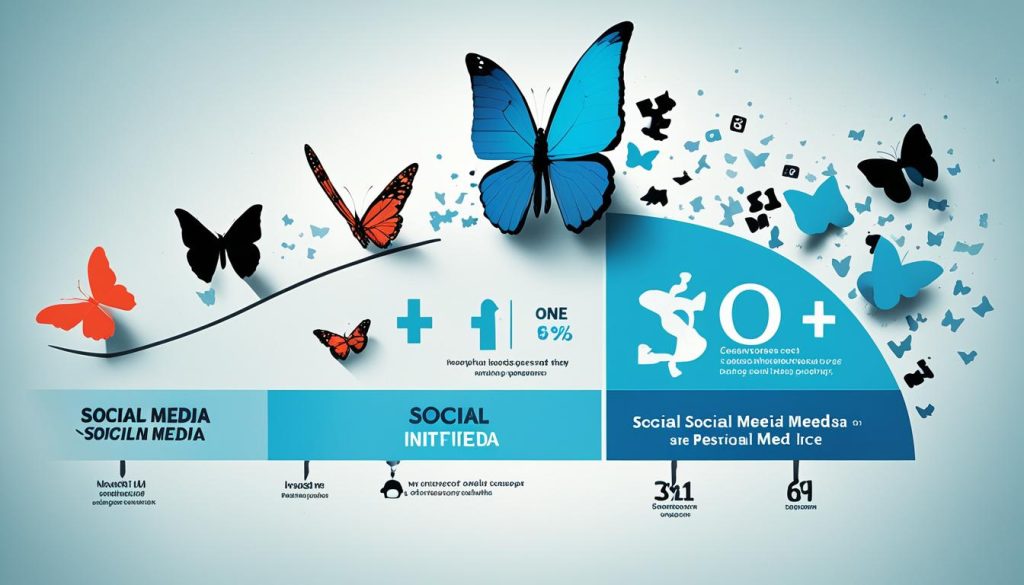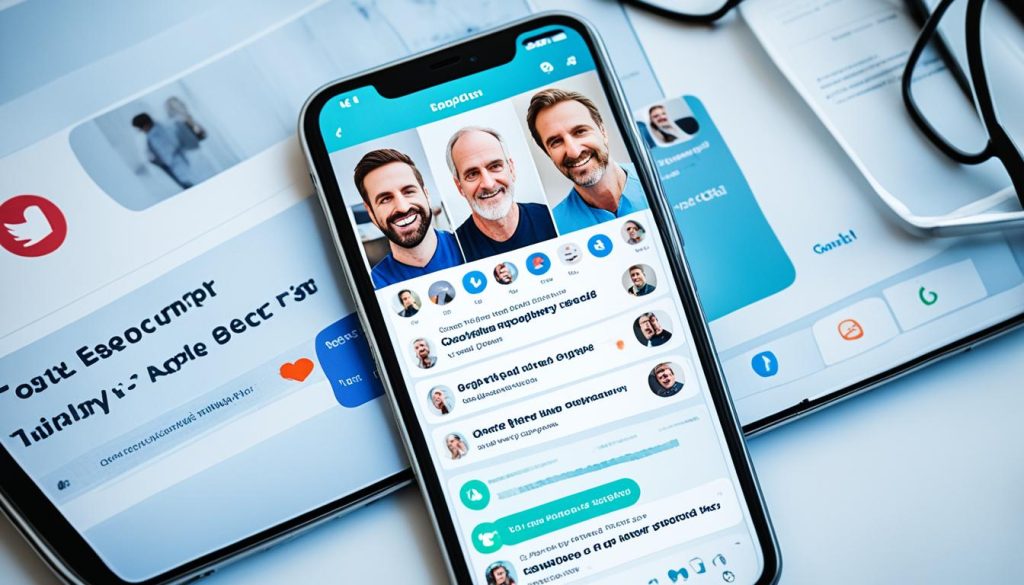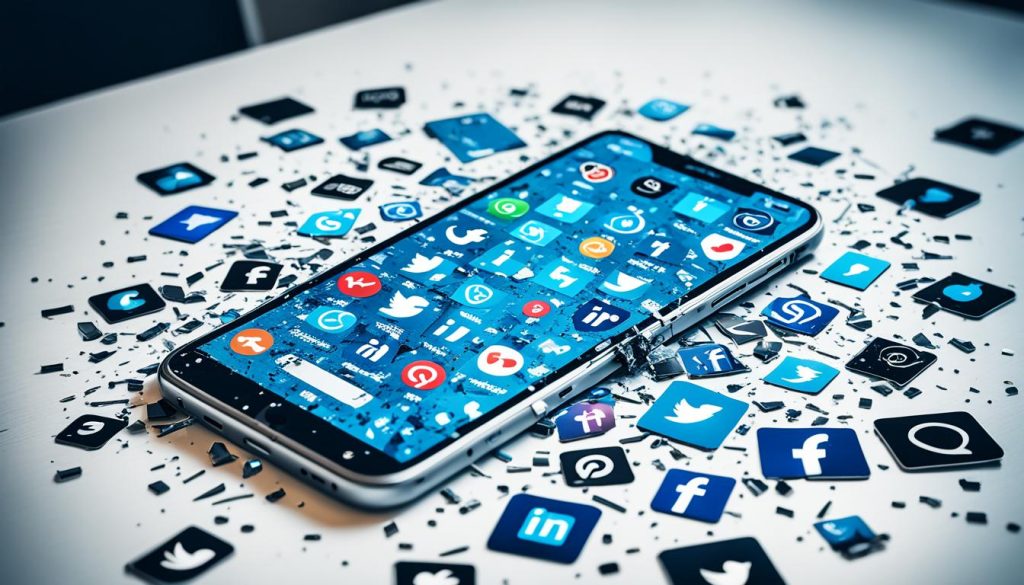Social media is a big part of our lives today. It lets us talk to friends, share news, and show who we are. But, it also brings new problems for people in personal injury cases1. Most adults use social media to talk and share info1. This online stuff can really change how personal injury claims go.
Social media can hurt personal injury cases by showing evidence that says the injuries aren’t real1. For example, posts on Facebook or Foursquare might show you were active when you said you weren’t1. Also, it could show you did things after the injury that you said you couldn’t do1. And, if someone on social media says they saw you doing something, it could hurt your case1.
Plus, what you post on social media can be used as evidence in court1. Even if you make your accounts private, the other side might still find your posts through legal ways1. This can make cases harder, especially in places like Nevada where the rules are unclear1.
Key Takeaways
- Social media can negatively impact personal injury cases by providing evidence that contradicts the injuries claimed by the individual.
- Social media posts and statements made outside of court can be admissible evidence against the party in trial, especially in personal injury cases.
- Setting social media accounts to private may not prevent the other party from accessing relevant records through legal discovery rules.
- Ambiguity in discovery rules, such as in Nevada, can lead to conflicts over the relevancy of social media records, complicating cases.
- Professionals recommend limiting social media activity during personal injury claims to avoid jeopardizing the case.
Understanding the Risks of Social Media in Personal Injury Cases
Social media can be a big risk for people in personal injury cases. Insurance companies and defense lawyers look closely at what people post online. They look for anything that could weaken a claim2. Even posts about everyday life can be twisted to make it seem like injuries aren’t as bad as claimed2. Saying something online that suggests you were at fault can really hurt your case2.
Social Media Posts as Evidence
Anything you post on social media can be used against you in court2. Lawyers for the other side search for posts that question your trustworthiness3. The courts are starting to accept social media posts as evidence more often3.
Compromising Credibility and Character
Some social media posts can hurt how people see you in court2. Posts that show you’re taking risks or using drugs can make you seem less credible2. People look at your social media to see if you seem trustworthy or if you might be exaggerating your injuries3.
But, social media can also help in personal injury cases3. Being honest and consistent online can back up your claims and keep you credible2. It can also show how injuries have changed your life2.
“Understanding the difference between public and private information on social media is crucial for individuals involved in personal injury claims.”
In the end, being careful with social media in personal injury cases is key3. You should watch what you post and know how it could affect your case3. Talking to a skilled personal injury lawyer can help you use social media wisely and ethically3.
Best Practices for Social Media Use During a Personal Injury Claim
When dealing with a personal injury claim, be very careful with your social media use4. Before 2011, using social media in court was rare4. But, the Ottenhof v Ross case in 2011 was the first to use social media in court4. Now, insurance companies check your social media on sites like Facebook, Twitter, and Instagram4. In 2018, the Ontario Court of Appeal let Facebook videos and photos be used in a personal injury case4.
Here are some tips to keep your social media safe during your claim:
- Adjust privacy settings to the highest level to limit who sees your posts4. Don’t tag yourself in posts with people you don’t know to keep your info private4.
- Wait before posting after an accident to avoid misunderstandings4.
- Don’t post new content while your claim is open to keep your case safe4.
- Think about getting a personal injury lawyer for advice on social media during your claim4.
Changing your social media to private can help, but insurance companies can still get court orders to see your accounts5. Remember, social media is often used against accident victims in personal injury cases5.
By following these tips, you can protect your personal injury claim and avoid social media being used against you4. Avoid posting and be careful online to keep your case and recovery safe4.
social media impact, personal injury, legal cases
Social media is a big part of our lives today. It also plays a big role in personal injury cases. It’s important for people in these cases to know the risks and manage their online presence well.
Avoiding Contradictory Posts
Social media can hurt a personal injury case if you post things that go against your claim. For example, if you say you’re very hurt but then post pictures of you hiking, those pictures can be used against you6. Lawyers for the other side look for these kinds of posts to weaken your claim about how hurt you are.
Monitoring Online Connections
Be careful about who you connect with on social media too. Insurance companies might try to look at your profile by asking to be friends or follow you7. If you accept friend requests from people you don’t know, they could see your posts and use them against you in court.
To avoid problems with social media in personal injury cases, change your privacy settings, don’t talk about your case online, and teach your friends and family about the dangers of sharing things that could hurt your case7. By being careful, you can protect your case and avoid social media issues.
In summary, social media has a big effect on personal injury cases. You need to be careful with your online presence, avoid posting things that could contradict your claim, and watch who you connect with online to protect your legal rights8. By knowing the risks and acting wisely, you can handle the challenges of social media and personal injury cases better678.

The Role of Social Media in Providing Evidence
Social media can be a strong ally for people in personal injury cases. By sharing their injury journey and recovery on social media, they can gather important evidence9. This includes sharing photos or updates that show their injuries and how they affect their life.
It also helps show how injuries change their life quality9. By talking about how they can’t work, enjoy hobbies, or go out because of their injuries, they build a case. This can help them claim for lost wages or a lower quality of life.
Documenting Injuries and Recovery
Insurance companies and defense lawyers often look at social media in personal injury cases9. Even with privacy settings, they can find social media content through legal means like discovery requests or court orders9. To use this to their advantage, plaintiffs should document their injuries and recovery online. This creates a visual record that can boost their case.
Proving the Impact on Quality of Life
Plaintiffs can also show how their injuries affect their life beyond physical harm9. By sharing how their injuries stop them from working, enjoying hobbies, or being social, they build a case. This can help them claim for lost wages or a lower quality of life.
About 56% of personal injury cases use social media evidence10. Cases with social media evidence are 46% more likely to win for the side that presents it10. Social media posts make up 78% of all evidence in personal injury lawsuits10. This makes social media a key tool for plaintiffs to strengthen their claims and possibly get more compensation10.

Using social media to document injuries, recovery, and life changes can make a strong case for plaintiffs9. But, it’s important to be aware of the risks and challenges of using social media in a personal injury claim, as mentioned earlier.
Conclusion
Social media has a big impact on personal injury cases. It can help show injuries and how they affect someone’s life11. But, it also brings risks that need careful handling11. Posts on social media can greatly affect legal cases, as lawyers look for evidence that challenges a plaintiff’s claims12.
People in personal injury cases must be very careful online. They should avoid posts or chats that could hurt their case in court12. Knowing the dangers of social media, like losing credibility, helps plaintiffs protect their rights and get the compensation they need12.
Being aware of how social media affects personal injury cases is key. By managing their online actions, plaintiffs can make sure their case is seen in the best light. This way, they can get the best outcome for their case12.
FAQ
How can social media impact personal injury cases?
Social media is a big part of our lives, but it can hurt or help in personal injury claims. Insurance companies use social media to find evidence against you. Even simple posts can be twisted to question your story and the seriousness of your injuries.
Why is it crucial for plaintiffs to exercise caution on social media during a personal injury case?
What you post on social media can hurt your case. Adjusters and lawyers look at your social media to find things that can weaken your claims. Posts about your daily life or travel can make it seem like your injuries aren’t as bad. Saying you were at fault on social media can also affect your case.
How can social media posts damage a plaintiff’s credibility or character in a personal injury case?
Some social media posts can make you look bad to a jury or judge. Posts that show you’re reckless or use drugs can hurt your case. They might think you’re not trustworthy or that you’re exaggerating your injuries.
What are the best practices for plaintiffs to mitigate the risks of social media during a personal injury claim?
To avoid social media risks in a personal injury claim, be very careful online. Set your privacy high, avoid case-related posts, and be careful with new friends. Don’t delete posts or messages, as that looks like hiding something.
How can contradictory social media posts impact a personal injury case?
Contradictory posts can really hurt your case. Claiming severe injuries but posting about hiking or traveling can be used against you. Defense lawyers look for this to show your injuries aren’t as bad as you say.
Why is it important for plaintiffs to be vigilant about their online connections during a personal injury case?
Be careful about who you connect with online, as insurance companies might try to see your profile. Accepting friend requests from people you don’t know can give the defense access to your social media. This could hurt your case.
How can social media be used to support a personal injury claim?
Despite the risks, social media can help your case. Use it to document your injuries and recovery. Post photos or updates that show how your injuries affect your life. It can also show the real impact of your injuries on your daily activities.
Source Links
- How Social Media Can Impact Your Injury Case | Adam Kutner
- What to Know About Social Media in Personal Injury Claims
- How Social Media Can Affect Your Personal Injury Case
- Best Practices For Social Media and Personal Injury Claims
- Social Media and Your Personal Injury Case: Best Practices for Accident Victims | Brooks Law Group
- The Impact of Social Media on Personal Injury Claims
- How Social Media Can Impact Your Personal Injury Case
- Social Media Evidence in Personal Injury | Allan Berger & Associates
- Social Media Impact on Personal Injury Claims
- Can social media be used as evidence in personal injury cases?
- The Impact of Social Media on Personal Injury Cases – Law Lawyers & Associates
- The Role of Social Media in Personal Injury Cases: Navigating the Digital Landscape – PMR Law

